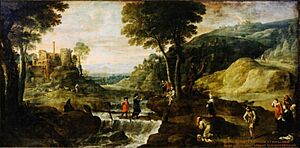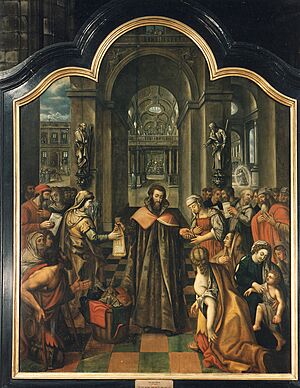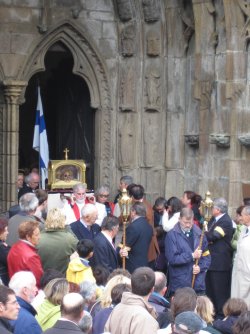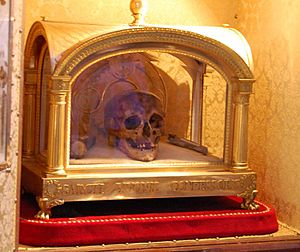Ivo of Kermartin facts for kids
Quick facts for kids SaintIvo of Kermartin, TOSF |
|
|---|---|
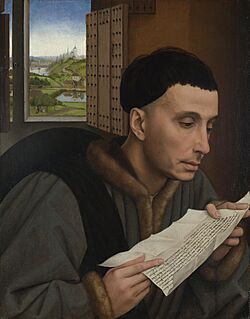
Saint Ivo portrayed by
Rogier van der Weyden (15th century) |
|
| Born | 17 October 1253 Kermartin, Duchy of Brittany |
| Died | 19 May 1303 (aged 49) Louannec, Duchy of Brittany |
| Venerated in | Roman Catholic Church |
| Canonized | June 1347 by Pope Clement VI |
| Major shrine | Tréguier, Cotes d'Armor, France |
| Feast | 19 May |
| Attributes | Purse in his hand, scroll, between a rich man and a poor one |
Saint Ivo of Kermartin (born October 17, 1253 – died May 19, 1303) was a very special priest from a place called Brittany in France. He is also known as Yves or Ives. He was famous for helping poor people and was the only parish priest from his time to become a saint.
Saint Ivo is the patron saint of Brittany, a region in France. He is also the patron saint of lawyers and children who have been abandoned. People sometimes call him the "advocate of the poor" because he always stood up for those who needed help. His special day is May 19th.
Contents
A Life of Learning and Helping Others
Ivo was born in a small town called Kermartin, near Tréguier in Brittany. This was on October 17, 1253. His father was Helori, a local lord.
When he was just 14, in 1267, Ivo went to the University of Paris. He studied civil law there. While other students partied, Ivo focused on his studies. He also spent time praying and visiting people who were sick. He even chose not to eat meat or drink wine.
Later, in 1277, he moved to Orléans to study Church law. He learned from a famous teacher named Peter de la Chapelle.
Becoming a Judge for the Church
After finishing his studies, Ivo returned to Brittany. He became an "official" in 1280. This meant he was a judge for the Church. He made sure that everyone got a fair trial.
Ivo was known for being very fair. He protected orphans and widows. He also defended the poor and made sure they were treated justly. People respected his decisions, even if they lost their case.
He often helped people settle their disagreements outside of court. This saved them money. Judges at that time sometimes accepted gifts, but Ivo always refused them. He wanted to be completely honest.
A Priest and a Helper
While working as a judge, Ivo also studied the Bible. He later joined a group called the Third Order of St. Francis. This group helps people live a holy life in the world.
In 1284, Ivo became a priest. He continued to use his legal skills to help others. Once, a mother and son were arguing a lot. Ivo offered a special Mass for them. Right after, they were able to agree and solve their problems.
The Bishop of Tréguier soon asked Ivo to be his main official. Ivo accepted in 1284. He was very dedicated to his work. He even stood up to the king when he thought the king was unfairly taxing the Church. Because of his kindness, people called him the "advocate and patron of the poor."
Ivo was then given charge of a church in Tredrez in 1285. Eight years later, he moved to Louannec. He worked very hard and often fasted. He passed away in Louannec in 1303.
The Story of the Widow of Tours
One famous story shows how clever and helpful Saint Ivo was. It happened when he was visiting the city of Tours. He was staying with a kind widow.
One day, he found the widow crying. She told him a sad story. Two traveling merchants had left a box of valuables with her. They told her to only give the box back if both of them asked for it together.
But then, one merchant came back alone. He said his partner was busy and asked for the box. The widow believed him and gave him the box. Later, the second merchant came back. He was angry because the box was gone. He blamed the widow and said she had to pay for the missing valuables. This would have ruined her.
"Don't worry," young Ivo told her. "You should have waited for both men, but I will help you."
The next day, in court, the merchant accused the widow. But Ivo stood up. "My client doesn't need to answer yet," he said. "The agreement was that both merchants had to ask for the box together. Only one is here. Where is the other?"
The judge agreed with Ivo. The merchant who was there turned pale and started shaking. The judge suspected something was wrong. He ordered the merchant to be arrested and questioned. The other merchant was found too.
It turned out the box was full of old junk! The two dishonest merchants had planned to trick the widow. They wanted her to pay them for "valuable" items that weren't even in the box. Thanks to Ivo, the widow was saved from their trick.
Saint Ivo's Lasting Impact
Even today, Saint Ivo is an important figure. In 2003, Pope John Paul II spoke about him. He said that Saint Ivo's ideas about fair justice and helping the poor are still very important. He encouraged people to make sure everyone's rights are protected, especially those who are weakest.
Saint Ivo is the patron saint of lawyers. Because of this, many law schools and groups of Catholic lawyers are named after him. For example, there's the Society of St. Yves in Jerusalem. It's a center that helps people with human rights and legal aid.
Honoring Saint Ivo
Saint Ivo was buried in Minihy-Tréguier, in the church he helped build. There is a special monument in the Tréguier Cathedral. It has a Latin saying that means: "Saint Ivo was a Breton, A lawyer and not a thief; A wonderful thing for the people to see."
Ivo became a saint in June 1347. This happened because Pope Clement VI agreed to it. During the investigation into his holiness in 1331, many people from his town shared stories about his kindness. They said he preached often and that because of him, "the people of the land became twice as good as they had been before." His sermons taught people about good behavior. It is said he "chased immorality and sin from the village of Louannec."
Saint Ivo is often shown holding a purse in one hand. This is to remember all the money he gave to the poor. In his other hand, he holds a rolled paper, showing his role as a judge. Another common picture of him shows him standing between a rich person and a poor person, highlighting his fairness to everyone.
Two churches in Rome are named after him: Sant'Ivo alla Sapienza and Sant'Ivo dei Bretoni.
See also
- Statue of Ivo of Kermartin, Charles Bridge
 | Aaron Henry |
 | T. R. M. Howard |
 | Jesse Jackson |


